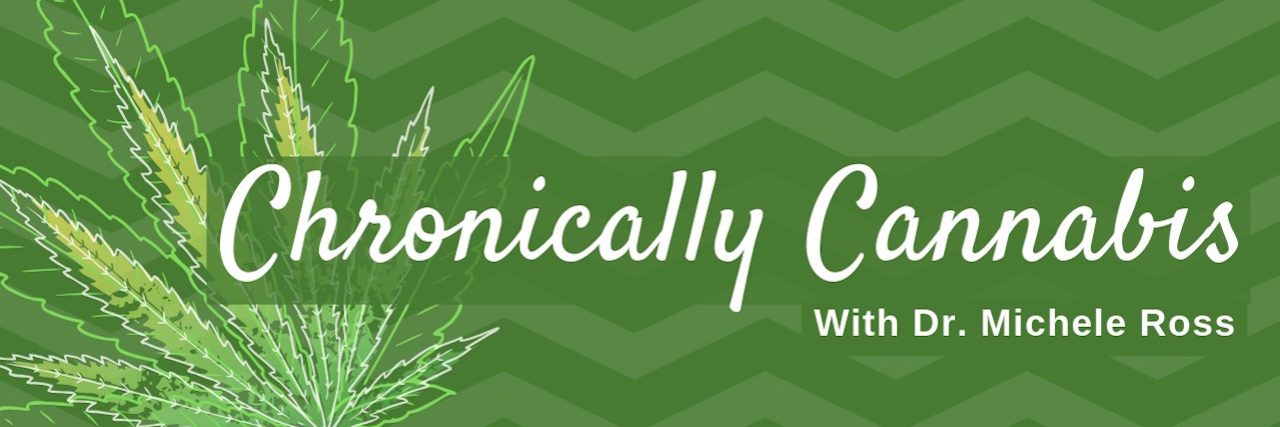Chronically Cannabis With Dr. Michele Ross: Can You Become Desensitized to Cannabis?
In Chronically Cannabis, Dr. Michele Ross, a neuroscientist and cannabis expert, answers the Mighty community’s questions about treating chronic pain with cannabis.
Editor's Note
Pain medications may become less effective over time, as your body builds up a tolerance. In this column, Dr. Michele Ross explains whether cannabis users should be concerned about desensitization.
Any medical information included is based on a personal experience. For questions or concerns regarding health, please consult a doctor or medical professional.
The Mighty community asked: “Is it possible to become desensitized to CBD products and, if so, does increasing the dosage carry any risks?”
From what I’ve seen with other patients, you don’t need to increase the dose. Your body isn’t going to become ridiculously tolerant to CBD or even THC. What’s nice about THC and CBD is, unlike opioids where you do need to keep increasing your dose, if you are building up a slight tolerance to these products, you could always take a day off. Literally, it takes about 24 to 48 hours to reset your tolerance. You won’t have the same withdrawal syndrome when you use opioids. It’s not going to be that miserable of an experience. I say this with experience because I used to be on morphine before I was on cannabis.
If you need to take a tolerance break for a day or two, do that. It will reset everything. If you have some insomnia or irritability during that time (that’s what the withdrawal of THC is), you can use CBD to help balance it out. The answer to any tolerance issues with THC is to use more CBD.
We haven’t seen CBD desensitization at all. It’s amazing because CBD and THC have so many broad effects on the entire body. CBD directly activates serotonin receptors and indirectly activates opioid receptors and cannabinoid receptors. Imagine if it caused tolerance with all these receptors. It would be horrible.
But what we’re seeing, especially in very severe chronic illnesses, if anything, there are some people who need additional cannabinoids. For example, before escalating your dose for chronic pain, if you feel like something isn’t as effective, THC-A is one of my favorite cannabinoids for chronic pain, autoimmune disorders and inflammation.
THC-A is what’s made in the plant. When you smoke or heat up the cannabis, THC-A turns into THC. THC-A doesn’t cross the blood-brain barrier like THC so it doesn’t get you high. It relieves pain and inflammation without psychoactive effects. People don’t even know that there’s actually a version of THC that’s not psychoactive. You have to buy tinctures that are specifically for that.
If any patient thinks their product isn’t working for them anymore, I would suggest buying a tincture or product with THC-A in it. You don’t need to take as much of that as you do CBD or THC. But THC-A is just fabulous for autoimmune pain, fibro pain, arthritis, etc. I recommend every patient has a THC tincture, a THC-A tincture and a CBD tincture. That way you can explore what works for you — two drops of this, 10 drops of that.
Glossary of Terms
Cannabis: Also known as marijuana, weed and pot, cannabis is a plant that can be eaten, brewed, smoked and vaporized. Its oils can also be extracted and consumed, or incorporated into topical creams. Cannabis is consumed for its psychoactive and pain-relieving properties. It is currently a Schedule 1 drug in the United States and is illegal at the federal level, but is legal for recreational and/or medical use in 33 states.
THC: Abbreviation for tetrahydrocannbinol, one of the compounds, or “cannabinoids,” found in cannabis. It is responsible for the plant’s psychoactive effects, since it binds to cannabinoid receptors in the brain responsible for pleasure and pain.
CBD: Abbreviation for cannabidioil, another cannabinoid found in cannabis. CBD is non-psychoactive and, unlike THC which binds to cannabinoid receptors, stimulates the body’s own endocannabinoid system. This can lead to physical benefits like reducing pain and lowering inflammation.
Endocannabinoids: Neurotransmitters produced by the body that bind to cannabinoid receptors. Endocannabinoids help control functions like pain and inflammation and maintaining homeostasis in the body.
Strain: A variation of cannabis that has been bred to enhance certain characteristics and compounds.
Terpenes: Aromatic oils secreted by the cannabis plant, which give its particular strain unique flavors and scents. Over 100 types have been identified. Terpenes also interact with other cannabis compounds to produce various physical and psychoactive effects.
Indica: A type of cannabis plant characterized by short stature and broad leaves, which grows better in a colder climate. Previously believed to offer relaxing and pain relieving-benefits, it’s now understood to offer similar benefits as other cannabis varieties.
Sativa: A type of cannabis plant characterized by its tall height, narrow leaves, which grows better in warmer climates. Previously believed to offer invigorating, energetic benefits, it’s now understood to offer similar benefits as other cannabis varieties.
Tincture: A concentrated liquid herbal extract that is taken by mouth. Cannabis tinctures can be consumed under the tongue or mixed with food and drinks.

